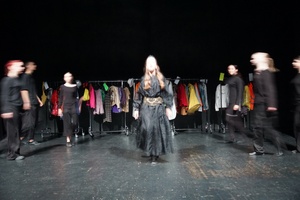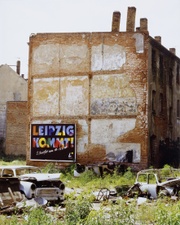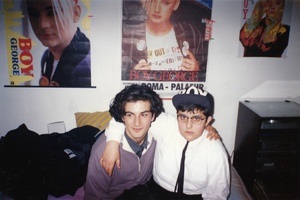ALLE FRAGEN OFFEN I-III
In the organizer's words:
Accompanying the double evening "White Elephants + Nostaliga Up & Down"
All Questions Open I: Opening of the exhibition Censorship in GDR Theater
On the history of theater censorship in the GDR and methods of circumventing it
by Phil Wegerer and Christian Müller
The lecture is a presentation of the Citizen.KANE.Kollektiv's research on theater and censorship in the GDR - all in the context of their production Weiße Elefanten. It will focus on an initial conclusion of their approach to collecting archival materials, texts and oral histories from a period of critical theater in East Germany from 1949-89. The lecture will focus on the methods, approaches and tools they have found to preserve a critical aspect of theater. Alongside stories of the denounced, banned and unwanted productions of texts by playwright Heiner Müller, for example, some of the effects of censorship and resistance will be made tangible - with the particular aim of shedding light on the personal dimension of being labeled undesirable and subversive by the authorities.
All questions open II - From then to now
A round of interviews with contemporary witnesses
With Cornelia Schwab and others.
In a round of interviews with contemporary witnesses, we want to take a concrete look at censorship in GDR theater. We will talk about the ban on a production of "Wolokolamsker Chaussee" in 1988 at the Poetisches Theater "Louis Fürnberg" in Leipzig. We will ask ourselves how theater could be made at that time, which approaches and ideas could be realized and which could not. What effects does it have when critical art meets an authoritarian regime? With this format, we want to open up the present by looking at the past in order to be prepared for a possible future.
All Questions Open III - Lecture TabThePAST: Censorship and Repression in Romania
by Dr. Mihaela Michailov and Dr. Radu Apostol
The lecture focuses on the TabThePAST research project and its focus on the period 1975-1989, with an emphasis on theater life in general and in particular on the decree on the merger and self-financing of cultural institutions. It is about the arc of a general perception of self-financing - using concrete examples of theaters. It revolves around the performativity of archives, culminating in the spectacular concept of the production Nostalgia Up&Down.
TabThePAST. Taboo History. Fill the Past to Sense the Present is a research project initiated by UNATC "I.L. Caragiale", Bucharest, Romania, in collaboration with the Replika Center for Educational Theatre and the Citizen.Kane Collective. It was funded by the European Union through the European Education and Culture Executive Agency (EACEA) as part of the Europe for Citizens (EFC) program.
All questions still remain I:
On the history of theater censorship in the GDR and methods to avoid it
by Phil Wegerer and Christian Müller
The lecture is a presentation of a first thorough collection of Citizen.KANE.Kollektiv's research into theater and censorship in the GDR - all in the context of their production White Elephants. It focuses on a first conclusion of their approach of collecting archive materials, texts and oral histories of a time of critical theatre in East Germany from 1949-89. The lecture centers in methods, approaches and tools they have found, with which a critical aspect of theatre was able to be retained. Alongside stories of denounced, forbidden and undesirable productions of texts by the playwright Heiner Müller, some of the workings of censorship and resistance will be made tangible - with a special aim to highlight the personal dimension of being/being labled undesirable and subversive by authority.
All questions remain II - From then to now
An Interview with contemporary witnesses
with Cornelia Schwab and others
We want to concretely deal with censorship in GDR theater through an interview with contemporary witnesses. The interview will focus on the ban of a production of Heiner Müller's "Volokolamsk Highway" at the Poetic Theatre "Louis Fürnberg" in Leipzig. Questions about how to make theatre in such a situation, which approaches and ideas were able to be realized and which not, will be centered on in this interview. What are the consequences, when critical art encounters an authoritarian regime? With this format, we want to make sense of the present by looking at the past, in order to brace ourselves for a possible future.
All questions still remain III - Lecture TabThePAST: Censorship and Repression in Romania
by PhD Mihaela Michailov and PhD Radu Apostol
The lecture is centered on the TabThePAST research project and on the context of the period 1975-1989, with an emphasis on theatrical life as a whole and especially on the decree regarding the merger and self-financing of cultural institutions. It is about the frame of a general perception of self-financing - with concrete examples of theaters. In the end, it circles towards the performativity of archives, culminating in the spectacular concept proposed in the production Nostalgia Up&Down.
TabThePAST. Taboo History. Fill the Past to Sense the Present is a research project initiated by UNATC "I.L. Caragiale", Bucharest, Romania, in partnership with Replika Center for Educational Theatre and Citizen.Kane Collective. It was financed by the European Union, through European Education and Culture Executive Agency (EACEA), within the programEurope for Citizens (EFC).
This content has been machine translated.



![Fritzi war dabei [8 plus]](https://imageflow.rausgegangen.de/url/https%3A//s3.eu-central-1.amazonaws.com/rausgegangen/YUL4iIXySVyXA8Gw3t51_20240429_TDJW_FRITZI_0080.jpg?width=300&height=225&mode=crop)






